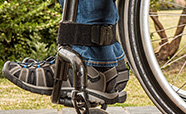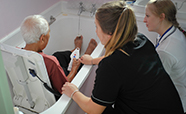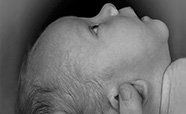Postgraduate study in rehabilitation
Learn new ways of thinking from our interprofessional team of rehabilitation experts and support your patients to get back to full participation in their lives.
We offer distance-taught courses at the postgraduate certificate, diploma, master's, and PhD level.
- Postgraduate Certificate in Rehabilitation (PGCertRehab)
- Postgraduate Diploma in Rehabilitation (PGDipRehab)
- Master of Health Sciences (MHealSc)
Please view our postgraduate rehabilitation subject webpage for information on all qualifications and for the link to enrol:
Papers
Our flexible programme allows you to choose from a wide range of papers so you can tailor your rehabilitation qualification to your area of interest.
Please note that not all papers are offered every year.
Paper Schedule (PDF)
REHB 701 Rehabilitation principles
 REHB 701 introduces frameworks to examine what rehabilitation is, how we do it, and the consequences for equity in rehabilitation access, experience and outcome. You will learn to critique core rehabilitation concepts drawing on your experiences, and will gain new insights for application in rehabilitation service delivery and design.
REHB 701 introduces frameworks to examine what rehabilitation is, how we do it, and the consequences for equity in rehabilitation access, experience and outcome. You will learn to critique core rehabilitation concepts drawing on your experiences, and will gain new insights for application in rehabilitation service delivery and design.
REHB 703 Musculoskeletal rehabilitation
 REHB 703 is a specialist paper in rehabilitation assessment and management of musculoskeletal disorders, including chronic pain conditions, arthritis and amputation. Gain the latest thinking in rehabilitation science to help people with chronic musculoskeletal conditions live well.
REHB 703 is a specialist paper in rehabilitation assessment and management of musculoskeletal disorders, including chronic pain conditions, arthritis and amputation. Gain the latest thinking in rehabilitation science to help people with chronic musculoskeletal conditions live well.
REHB 704 Neurological rehabilitation
 REHB 704 integrates neuroscience, clinical evidence and knowledge from your setting to explore the rehabilitation needs of “the whole person” with a neurological condition, and their family and whānau. Be inspired and challenged to improve neurorehabilitation access and outcomes in Aotearoa, New Zealand.
REHB 704 integrates neuroscience, clinical evidence and knowledge from your setting to explore the rehabilitation needs of “the whole person” with a neurological condition, and their family and whānau. Be inspired and challenged to improve neurorehabilitation access and outcomes in Aotearoa, New Zealand.
REHB 706 Work rehabilitation
 REHB 706 offers a strategic and evidence based view of how to promote safe and effective return to work – suitable for all health professionals wanting to learn more about work rehabilitation. This paper is particularly suited for ACC Case Managers or Vocational Rehabilitation Service providers.
REHB 706 offers a strategic and evidence based view of how to promote safe and effective return to work – suitable for all health professionals wanting to learn more about work rehabilitation. This paper is particularly suited for ACC Case Managers or Vocational Rehabilitation Service providers.
ACC's postgraduate training requirements (PDF)
REHB 707 Rehabilitation for older adults
 REHB 707 explores assessment, rehabilitation and management of conditions that cause impairments, activity limitations, and participation restrictions in old age.
REHB 707 explores assessment, rehabilitation and management of conditions that cause impairments, activity limitations, and participation restrictions in old age.
REHB 710 Rehabilitation service innovation and evaluation
 REHB 710 teaches the skills required for best practice service evaluation, design and monitoring in rehabilitation contexts. Learn how to accurately scope projects, apply frameworks to lead project teams, gather and report information that robustly answers the intended question. Design and evaluation processes that fit te ao Māori and other world views are addressed.
REHB 710 teaches the skills required for best practice service evaluation, design and monitoring in rehabilitation contexts. Learn how to accurately scope projects, apply frameworks to lead project teams, gather and report information that robustly answers the intended question. Design and evaluation processes that fit te ao Māori and other world views are addressed.
REHB 714 Personal and psychological factors in rehabilitation
 REHB 714 explores psychological aspects of rehabilitation, ranging from the presence and effect of co-morbid mental disorders, to the influence of personal factors that promote resilience and recovery. Students will learn about mental health care and treatment for people with physical health conditions, and will gain a broad understanding of what contributes to our psychological well-being.
REHB 714 explores psychological aspects of rehabilitation, ranging from the presence and effect of co-morbid mental disorders, to the influence of personal factors that promote resilience and recovery. Students will learn about mental health care and treatment for people with physical health conditions, and will gain a broad understanding of what contributes to our psychological well-being.
REHB 716 Rehabilitation with children
 REHB 716 delves deep into family-centred rehabilitation with children who have congenital or acquired health conditions, unpacking the clashes in ideology that family-centredness can impose on health professionals, service and policy designers and advocates for children and families. This paper is intended for those supporting children and their whānau in their management of child-related health and disability issues.
REHB 716 delves deep into family-centred rehabilitation with children who have congenital or acquired health conditions, unpacking the clashes in ideology that family-centredness can impose on health professionals, service and policy designers and advocates for children and families. This paper is intended for those supporting children and their whānau in their management of child-related health and disability issues.